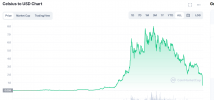I have no idea,
@Dublinbay12 - but then I'm not sure if that's the right way to look at it anyway. Shouldn't we just let the market decide?
If in your particular case, you no longer have a use case for them, then for sure - don't use them. However, I think there are different groups/categories of users of these things with different use cases being applied. I really never saw much chatter about the tax aspect being a leading motivation - I'm open to correction but I'm fairy sure that in most places, there's been clarity on this for a while (i.e. if you trade from one digital asset to another, that's a taxable event). The explosion in the use of stablecoins has come in after that clarification.
Insofar as I understand it, they provide less friction. For the digitally native, you can swap between a stable and other digital assets on a decentralised exchange with ease. Furthermore, there have been major issues with interaction between this new world of digital assets and the legacy banking system - and there still are. I'd wager that plenty of folks see the idea of simply staying within the crypto ecosystem as far more frictionless than trading in and out of it via the legacy system.
Stables also give the holder the ability to take direct ownership rather than have a bank custody funds. There's some value in that. We also have to always remember that our experiences are not everybodies. These digital assets are a global phenomenon that transcend borders. If you're in country X where the local currency is unstable, a mixture of crypto and stables may be a very attractive prospect. If you're already in that eco-system, its then easier to get your hands on USD equivalent - in spite of capital controls that potentially are being applied by government.
Also for lending markets, stables are playing a role. In developing nations, finance for small businesses can be hard to acquire or very expensive. Collateralised lending is becoming a big deal on that basis. Then from the perspective of the Americans, many think that they are (either consciously or accidentally) getting the upper hand here - as USD stables are actually advancing the use of the dollar globally - just in a different form.
Of course, there are risks - whether it's concerns with the backing via centralised stablecoins or algo design when it comes to algorithmic stables. From that perspective, it's one big experiment that's ongoing. With that, I'd expect there's plenty of development in the works. I've no doubt but that there will be more regulation on the way where centralised stables are concerned and they'll probably move from being buyers of commerical paper to buyers of bonds.
You previously expressed interest in algorithmic stablecoins. I'd love to see them work - but as per this weeks example (the implosion of Terra), it remains to be seen if there is a design possible that can be implemented where they can't be unhinged. We'll have to wait and see how that develops. Would be great if it was possible as then there's no concern about backing.
:quality(70)/cloudfront-eu-central-1.images.arcpublishing.com/irishtimes/Z3LP4YAEGI3CH5S7ARTJUWKLRM.jpg)
 www.irishtimes.com
www.irishtimes.com
:quality(70)/cloudfront-eu-central-1.images.arcpublishing.com/irishtimes/Z3LP4YAEGI3CH5S7ARTJUWKLRM.jpg)

